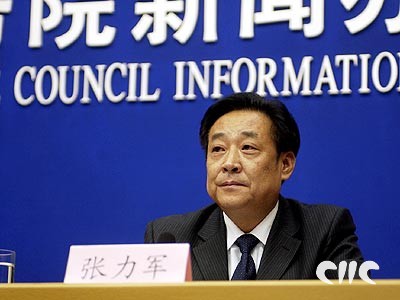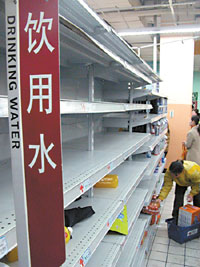Pollution Grows Along With China's Economy
By Antoaneta Bezlova
BEIJING, Nov. 29, 2005 (IPS/GIN) -- As China grappled with the fallout of trying to cover up a toxic spill in the country's impoverished northeast, the incident highlighted concerns about environmental disasters triggered by China's rapid urbanization and industrialization.
An explosion at a state-owned chemical factory in Jilin city earlier this month caused large quantities of poisonous benzene to flow into the Songhua River that runs through Harbin city, forcing authorities to shut off running water to the 3.8 million residents for five days.
Though Harbin authorities reacted slowly and misled the public about what happened, the central government mobilized resources rapidly, delivering tons of bottled water to head off panic and sending teams of officials to reassure fleeing inhabitants.
And as contamination in the Songhua threatened to spread to the Amur River across the border with Russia, Chinese Foreign Minister Li Zhaoxing issued a public apology to Russia, expressing "regret over the possible harm to be done to the Russian people by the major environmental pollution accident."
But little was said or done to alert the rural communities in numerous towns and villages along the Songhua between Jilin and Harbin about the dangerous chemicals flowing in the water. The authorities have offered no estimates on how many people rely on the river for drinking water.
After the news of the spill filtered to the villages surrounding Harbin, peasants started digging wells for water, the local media reported. But the environmental organization Greenpeace has warned that if any industrial chemical has seeped into the ground, the impact on the environment would be long term.
The Nov. 13 explosion released into the river about 100 tons of benzene, which is highly toxic and carcinogenic. High-level exposure to benzene is known to cause leukemia, and there are concerns that the same effects could result from long-term low-level exposure through water or food.
"We urge the Chinese government to make even greater efforts in protecting the local people and the environment," said Kevin May, toxics campaign manager of Greenpeace China. "It should, for example, conduct a comprehensive environmental impact assessment of the pollution and, on that basis, draw up a plan and implement effective cleanup."
Pollution concerns have been behind a string of protests across the country in recent months. The link between local governments and factories that flout environmental regulations has aroused sharp criticism of the Communist Party and government officials.
In the latest incident, officials in Jilin suppressed news of the spill, some few hundred kilometers upriver from Harbin, for more than 10 days.
Public concern is also fueled by a lack of information in the past about health alarms, such as the spread of severe acute respiratory syndrome (SARS) in 2003 and natural disasters where death tolls and the scope of environmental hazards were, until recently, considered state secrets.
Now, even the usually docile state-run media has accused the government of mishandling a potential environmental catastrophe in Jilin.
The Beijing Youth Daily, the mouthpiece of the Communist Party's youth league, accused the authorities of an unjustifiable lie that had "reduced public trust in the government."
The English-language China Daily drew attention to the costs of China's rapid economic development, which has blatantly disregarded environmental preservation.
"The 'GDP mania,' or preoccupation with gross-domestic product of growth, has contributed to the ignorance of work safety, pollution and educational needs, in some cases," said an editorial in the Tuesday's paper.
But the sharpest criticism came from the People's Daily, the flagship of the party.
Life has returned to normal after several days of water supply problems for Harbin residents, the paper pointed out last week, "but it will be years before 300 million farmers in the countryside get access to clean drinking water free of fluorine, arsenic and other poisonous industrial elements."
"We should provide rural residents with enough safe drinking water. If this problem remains unresolved, it would be shameful for us to talk about a harmonious society," the paper said, referring to the Communist Party leadership's stated goal of putting poor people first and narrowing the yawning wealth gap between the urban and rural areas.
The paper had a series of sobering figures about the scarcity and quality of water supply in rural China. Today, some 96 million rural people lack daily access to drinking water; more than 30 million farmers drink bitter and salty water every day; some 54 million have to contend with water containing high levels of fluorine or arsenic.
Rapid industrialization and urbanization have increased demand for clean water, even as China's fast development has polluted the water table and turned many rivers into moving cesspools.
Government officials reckon 70 percent of China's lakes and rivers are polluted.
Speaking at a water seminar this month, Chen Bangzhu, a senior environmental expert, estimated 75 percent of the lakes were suffering from eutrophication, or water pollution caused by excessive plant nutrients in the form of fertilizers, sewage and industrial waste.
On average, 20 natural lakes "disappeared" in China every year, and about 1,000 inland lakes had vanished in the past 50 years, Chen said.
China's environmental situation is considered grim, even by Premier Wen Jiabao, who has warned that strain on the country's environment will only increase in the coming years as industrialization and development continue.
"We must see clearly that at present we are discharging more waste than our environment can bear," he told a meeting of the State Council this month.
"As our economy develops and our consumption of resources and energy increases, our efforts to protect the environment will face greater and greater pressure," the Xinhua news agency quoted him as saying.


 Doctors examine the chest X-ray results of an infant suffering from bird flu. The H5N1 strain of bird flu seen in human cases in China has mutated as compared with strains found in human cases in Vietnam.[AFP/file]
Doctors examine the chest X-ray results of an infant suffering from bird flu. The H5N1 strain of bird flu seen in human cases in China has mutated as compared with strains found in human cases in Vietnam.[AFP/file]





















